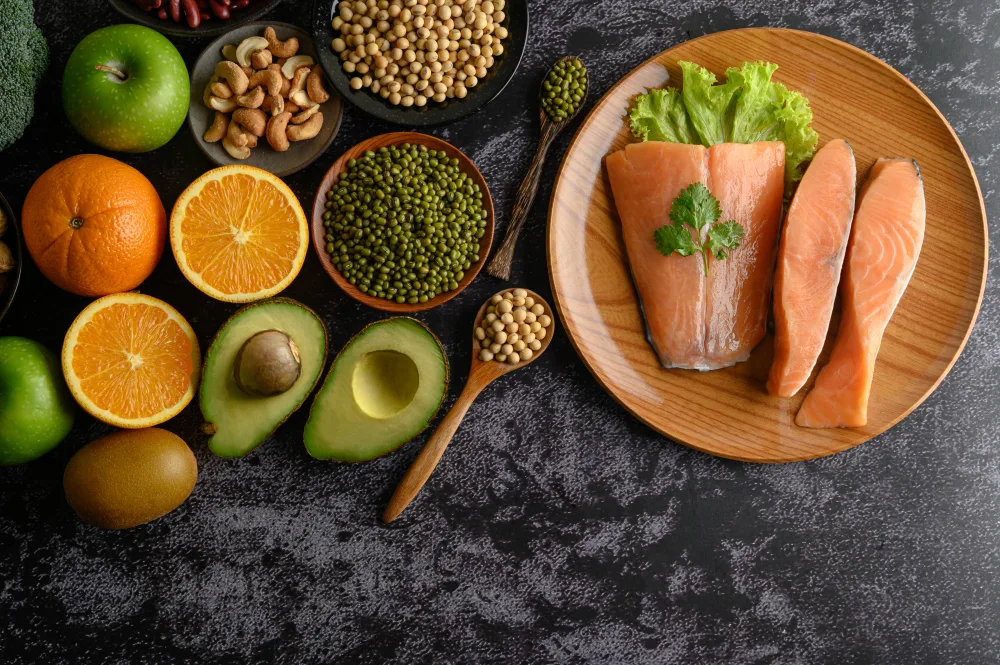Feeling stressed out and overwhelmed? It might be time to take a closer look at your cortisol levels. In this blog post, we’ll find out the top 5 cortisol lowering foods that can help you feel more balanced and relaxed.
Intro: cortisol lowering foods
Cortisol plays a crucial part in regulating metabolism, blood sugar levels, and immune function. However, when cortisol levels become chronically elevated, it can lead to a range of health issues. We can learn more about cortisol in next section.
One effective strategy for reducing cortisol levels is incorporating specific foods into your diet that have been shown to help regulate stress hormones. By making simple changes to what you eat, you can support a healthy cortisol balance and improve your overall health.
What is cortisol and what it does in our body?
Cortisol is often referred to as the “stress hormone,” playing a crucial role in our body’s response to stress. Produced by the adrenal glands, cortisol helps regulate various functions such as metabolism, immune response, and blood pressure.
When we encounter a stressful situation, cortisol levels spike to provide us with a burst of energy – commonly known as the fight-or-flight response. This heightened state of alertness can be beneficial in short-term stressful scenarios.
However, prolonged high levels of cortisol due to chronic stress can have negative effects on our health. It can lead to issues like weight gain, sleep disturbances, impaired cognitive function, and a weakened immune system.
In essence, cortisol serves as both a friend and foe in our body – essential for survival during acute stress but detrimental when constantly elevated. Balancing stress levels through healthy lifestyle choices is key to maintaining optimal cortisol balance.

High cortisol level will lead to feel constantly on edge and anxious.
What can happen if your cortisol levels are too high?
When your cortisol levels are too high, you might experience a range of physical and emotional symptoms. Your body’s stress response can go into overdrive, leading to increased heart rate, elevated blood pressure, and disrupted sleep patterns.
High cortisol levels can also impact your metabolism, leading to weight gain, particularly around the abdomen. You may find it difficult to lose weight even with diet and exercise. In addition, prolonged high cortisol levels can weaken your immune system, making you more susceptible to infections and illnesses.
Mood swings and irritability are common when cortisol is elevated for extended periods. You may feel overwhelmed or have difficulty concentrating on tasks. Chronic stress from high cortisol levels can also contribute to conditions like depression and anxiety disorders.
It’s important to be aware of the signs of high cortisol levels so that you can take steps to lower them through lifestyle changes and dietary adjustments.
Top 5 cortisol lowering foods
Are you looking to naturally lower your cortisol levels? Incorporating cortisol-lowering foods into your diet can be a great way to help manage stress and promote overall well-being. Here are the top 5 foods that can help regulate your body’s stress hormones.
1. Dark Chocolate
Adding a square or two of dark chocolate, which contains antioxidants that can reduce cortisol levels. Dark chocolate, especially varieties with high cocoa content (70% or higher), contains compounds that can potentially help with stress management. Aim for small portions of high-quality dark chocolate as part of a balanced diet as it has sugar and calories.
2. Berries
Blueberries, strawberries, and raspberries are packed with vitamins and nutrients that support adrenal health. Berries have a low glycemic index, meaning they cause a gradual and steady increase in blood sugar levels. Stable blood sugar levels can help prevent mood swings and energy crashes, promoting a sense of calm and well-being.
3. Fatty Fish
Salmon, mackerel, and sardines are rich in omega-3 fatty acids that have been shown to decrease cortisol production. They are essential for maintaining the structure and function of brain cell membranes. They support communication between brain cells and promote the production of neurotransmitters involved in mood regulation, such as serotonin and dopamine.

4. Avocados
Loaded with potassium and healthy fats, avocados can help lower stress hormone levels. They are rich in potassium, an essential mineral that plays a role in regulating blood pressure. Maintaining a healthy blood pressure can help reduce the physiological effects of stress on the body.
5. Leafy Greens
Spinach, kale, and other leafy greens provide magnesium to support relaxation and combat high cortisol. They are excellent sources of magnesium, a mineral known to play a crucial role in stress management. Magnesium helps regulate the body’s stress response system by modulating the release of stress hormones like cortisol. Adequate magnesium intake has been associated with lower levels of stress and anxiety.
Other natural ways to lower your cortisol levels
In addition to incorporating cortisol-lowering foods into your diet, there are other natural methods you can explore to help reduce stress and keep your cortisol levels in check. Regular exercise is a powerful way to manage stress and lower cortisol levels. Whether it’s yoga, running, or dancing, find an activity that brings you joy and helps you unwind.
Getting enough quality sleep is crucial for regulating cortisol production. Practice mindfulness techniques such as meditation or deep breathing exercises to calm the mind and reduce stress levels throughout the day.

Aim for 7-9 hours of restful sleep each night to support your body’s natural rhythm and hormone balance.
Drinking three liters of water a day is generally considered a healthy habit as it helps maintain proper hydration levels, supports bodily functions, and aids in flushing out toxins. However, it’s important to consume water in moderation and adjust intake based on individual needs, activity level, and climate.
As for stress levels, staying adequately hydrated can actually help mitigate stress. Dehydration can exacerbate stress symptoms, such as headaches, fatigue, and difficulty concentrating. By ensuring proper hydration, you’re providing your body with the support it needs to better cope with stress.
Spending time outdoors in nature has been shown to have a calming effect on the body and mind. Take regular walks in green spaces or simply sit outside and soak up some sunlight when possible. Prioritize self-care activities that bring you peace and relaxation, whether it’s reading a book, taking a bath, or enjoying a hobby you love.
Conclusion
As we end up our exploration of cortisol lowering foods, it’s clear that incorporating these items into your diet can have a positive impact on managing stress levels. Remember to include a variety of fruits, vegetables, and lean proteins to support overall health and well-being.
Experiment with different recipes and meal ideas featuring these cortisol-lowering foods to keep your meals exciting and flavorful. Don’t be afraid to get creative in the kitchen and mix things up to prevent boredom or monotony in your diet.
In addition to focusing on food choices, finding a balance between nourishing your body with the right foods and engaging in calming activities is key to promoting optimal cortisol levels.

Consider implementing relaxation techniques such as meditation, yoga, or deep breathing exercises to further reduce stress levels.
By prioritizing self-care practices that support both physical and mental well-being, you can work towards achieving a more balanced lifestyle. Stay mindful of how different factors may influence your stress levels and make adjustments as needed for long-term health benefits.
FAQ
Q: Can stress management techniques help lower cortisol levels?
A: Yes, practices like deep breathing, meditation, yoga, and regular exercise can all help reduce stress levels and consequently lower cortisol.
Q: How long does it take for cortisol levels to decrease after eating these foods?
A: The effects of these cortisol-lowering foods may vary from person to person. However, incorporating them into your diet regularly can contribute to maintaining healthy cortisol levels over time.
Q: Are there any side effects to consuming these foods in excess?
A: While the foods mentioned are generally safe when consumed in moderation as part of a balanced diet, excessive intake of certain items could lead to other health issues. It’s always best to consult with a healthcare provider or nutritionist for personalized advice.
By adding these top 5 cortisol lowering foods to your diet and adopting other natural methods to manage stress effectively, you can support your body’s overall well-being and maintain optimal cortisol levels. Remember that small lifestyle changes can make a big difference in how you feel both physically and mentally.
More search:
Role of plum in cholesterol management
Weight loss recipes for slimming
also, find more article about food
